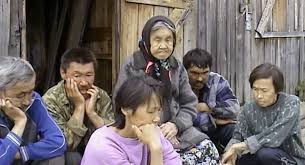I asked this question after viewing a documentary Happy People: A Year in the Taiga. In a small village of Russian settlers on the Yenisei River, which bisects central Siberia, the people live close to nature, isolated from any large city. The men trap sable, building traps the same way their ancestors did and making their own skis. Their few concessions to modernity are chain saws, snowmobiles, and outboard motors. During the winter months, the men leave the village to travel upriver to their huts deep in the forest where their traps are set. They endure the harsh sub-zero temperatures accompanied only by their beloved dogs.
But the glimpses that the film gives of the native Ket people of Siberia make the lasting impression. About 1200 Ket people survive. The depressed, sad facial expressions of these Russian-speaking people, who appear much like the North American native, contrast with the smiles of the Russian trappers and their families. A Ket man who gathers drift wood for fuel along the river comments that this is the work left to them, that they are drunkards who have lost their language, their ancestral crafts, and way of life. A wrinkled old woman still keeps the wooden dolls of her culture. A Ket man, who retains the knowledge of hollowing out logs for boats, help the Russian men build a dug-out boat.
The irony that the natives are unhappy and the interlopers are happy does not escape the viewer. This is a world turned upside down where the newcomers have usurped the land and the way of life of an indigenous population. The Russians relate how they love the forest and their closeness to nature. They are proud of their ability to make the things they need and to live off the fish and game of the land. The long summer days of sunlight in the subarctic region produce a bountiful harvest from their gardens. The Russians live happily in Siberia while the Ket men are demoralized because they have lost their native arts and language. One Ket man laments that they no longer live in tents.
As an American I cannot help but see the similarities between the Ket people and native North-American tribes. Linguists are finding links in the language of the Ket people to Athabascan languages of North America as well as cultural and biological connections. The sadness in the eyes of the Ket remind me of the late nineteenth century and early twentieth century photographs that captured the tragedy of the decimated, dying civilization of American Indians consigned to reservation land.
Maybe the director Werner Herzog intends the viewer to sense the irony and to question the stolen happiness of the Russians at the expense of the indigenous people. The Unhappy Ket People stand in the shadow of the Happy People.
The benefits of living close to the land in order to not lose a connection with all life is well-documented. That’s why so-called First World people love to dig in their gardens, why they move to the country, why they buy guns to hunt, why they go fishing, why they love to backpack and camp in the wilderness for a few weeks. Concrete and asphalt have covered much of the earth. Aerial photography shows that electricity has illuminated practically all of the globe at night except over places like Siberia. The back-to-nature movement cannot be unadulterated, for witness, the trappers’ use of snowmobiles and rifles. Yet indigenous cultures do teach industrialized society what has been lost and the necessity to preserve that connection to the earth from which we sprang and to which we will return.
To end this reflection on happy people, I offer:
Ode to the First People
Grateful to grass, thankful to tree, they the first people
Walk the world in accord with plant and animal.
Woven in the Great Spirit’s web all are equal.
Seeds sprout, fish spawn, birds soar, bears slumber,
Each turning upon the spinning wheel of time.
The battle over the plains and bison herds lost
The wails of the dead still shriek on the wind
Where warriors and their way of life both fell.
Wise elders rise to recite tales of stolen lands,
Broken promises and bullets in the back,
Frozen corpses in burn-out camps and death
Songs of the walking dead who trudge trails
Toward ground where the game have all fled,
Creeks run dry and no ancestors are buried.
Keenly they see even on their High Plains’ refuge
The land yet teems with the spirits of whatever
Has ever walked, breathed and finally cast off
Its coil to merge again with earth, sky and water.
This the way of the people, their ancient wisdom
To respect the union of what flies and what crawls,
What tricks and what sustains; they the hawk,
The snake, the coyote and the herds of bison.
Even as flint, the berry bush and willow branch
Tenderly wrought for hand and mouth of men
Deserve reverence and receive their blessings
As we the first people, grateful to grass, thankful to tree
Still walk the world in accord with plant and animal
Aware all are woven equally in the Great Spirit’s web.

